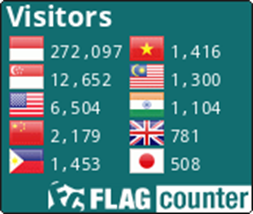Peran Brand Love sebagai Mediasi Hedonic Product dan Self-Expressive Brand Terhadap Brand Loyalty
DOI:
https://doi.org/10.26905/jbm.v7i2.4696Keywords:
Hedonic Product, Self-Expressive Brand, Brand Love dan Brand LoyaltyAbstract
This study aims to analyze the impact of hedonic products and self-expressive brands towards brand love and brand loyalty to Starbucks Coffee customers in Malang City. This study also analyzes the role of brand love as a mediator become an intermediary for hedonic products and self-expressive brands in influencing brand loyalty. The research object uses the Starbucks Coffee brand because Starbucks coffee is categorized as a hedonistic item and Starbucks builds a special bond with its customers. This type of research is descriptive quantitative. The research sample consisted of 125 customers of Starbucks Coffee Mall Dinoyo Malang with the sampling technique was carried out accidental sampling. Structural Equation Modelling (SEM) method using the IBM SPSS and IBM AMOS version 24.0 program is a method for analizyng data in this study. The results show that both hedonic products and self-expressive brands have a positive and significant impact on brand love. However, hedonic products and self-expressive brands do not have a direct influence on brand loyalty. Hedonic products and self-expressive brands have a significant effect on brand loyalty with the help of brand love as a mediator. Research also proves brand love has a positive and significant impact on brand loyalty.
Â
Downloads
References
Albert, N. and Merunka, D. 2013. The role of brand love in consumerâ€brand relationships. Journal of Consumer Marketing, Vol. 30 No. 3, pp. 258-266.
Alex, N. J., & Joseph, A. 2012. Hedonic Versus Utilitarian Values: The Relative Importance of Real and Ideal Self to Brand Personality and Its Influence on Emotional Brand Attachment. Vilakshan: The XIMB Journal of Management, 9(2).
Batra, R., Ahuvia, A., & Bagozzi, R. P. 2012. Brand love. Journal of marketing, 76(2), 1-16.
Carvalho, N. B., Minim, V. P. R., Nascimento, M., Vidigal, M. C. T. R., Ferreira, M. A. M., 902 Gonçalves, A. C. A., & Minim, L. A. 2015. A discriminant function for validation of 903 the cluster analysis and behavioral prediction of the coffee market. Food Research 904 International, 77, 400–40.
Cramer, L., & Antonides, G. 2011. Endowment effects for hedonic and utilitarian food products. Journal of Food quality and preference, 22(1), 3-10.
Drennan, J., Bianchi, C., Cacho-Elizondo, S., Louriero, S., Guibert, N., & Proud, W. 2015. Examining the role of wine brand love on brand loyalty: A multi-country comparison. International Journal of Hospitality Management, 49, 47-55.
Grisaffe, D. B., & Nguyen, H. P. 2011. Antecedents of emotional attachment to brands. Journal of business research, 64(10), 1052-1059.
Hoyer, W. D., & Stokburger-Sauer, N. E. 2012. The role of aesthetic taste in consumer behavior. Journal of the Academy of Marketing Science, 40(1), 167-180.
Huber, F., Meyer, F., & Schmid, D. A. 2015. Brand love in progress–the interdependence of brand love antecedents in consideration of relationship duration. Journal of Product & Brand Management.
Hwang, J & Kandampully, J. 2012. The role of emotional aspects in younger consumer-brand relationships. Journal of Product & Brand Management. Vol. 21 Iss: 2 pp. 98 - 108
International Coffee Organization (ICO). 2015. Global Coffee Forum, 2015. Milan. Diakses 1 Juli 2020
Labbe, D., Ferrage, A., Rytz, A., Pace, J., & Martin, N. 2015. Pleasantness, emotions and perceptions induced by coffee beverage experience depend on the consumption motivation (hedonic or utilitarian). Journal of Food quality and preference, 44, 56-61.
Langner, T., Schmidt, J., & Fischer, A. 2015. Is it really love? A comparative investigation of the emotional nature of brand and interpersonal love. Psychology & Marketing, 32(6), 624-634.
Lu, J. & Liu, Z. & Fang, Z. 2016. Hedonic products for you, utilitarian products for me. Judgment and Decision Making, Vol. 11, No. 4, July 2016, pp. 332–341
Messina, R. 2018. Hedonic and utilitarian aspects of coffee consumption in China. BS thesis. Università Ca'Foscari Venezia.
Manzo, J. 2014. Machines, People, and Social Interaction in “ Third-Wave †Coffeehouses. Journal of Arts and Humanities (JAH), Volume -3, No.-8, August, 2014.
Putlia, G., 2018 . Konsumerisme Mahasiswa Terhadap Starbucks Coffee Dalam Kerangka Teori Fetisisme Komoditas Dan Motivasi Hedonis. National Conference of Creative Industry: Sustainable Tourism Industry for Economic Development iversitas Bunda Mulia, Jakarta, 5-6 September 2018.
Rahmania, Wahida. 2016. Starbucks Hadir di Malang. https://www.malangtimes.com/
Ramadhina, F.A. 2017. The influence of hedonic product, self-expressive brand, and satisfication on brand love and brand loyalty: study of starbucks’ consumers in Malang. Jurnal Ilmiah Mahasiswa FEB, Vol 5, No 2: Semester Genap 2016/2017.
Ruane, L. and Wallace, E. 2015. Brand tribalism and self-expressive brands: social influences and brand outcomes. Journal of Product & Brand Management, Vol. 24 No. 4, pp. 333-348.
Shirdastian, H., Laroche, M., & Richard, M. O. 2019. Using big data analytics to study brand authenticity sentiments: The case of Starbucks on Twitter. International Journal of Information Management, 48, 291-307.
Sugiyono, M. 2012. Metode Penelitian Kuantitatif R&D. Bandung: Alfabeta.
Wallace, E., Buil, I., and Chernatony, L.d. 2014. Consumer engagement with self-expressive brands: brand love and WOM outcomes. Journal of Product & Brand Management, Vol. 23 No. 1, pp. 33-42.
Wisnubrata. 2017. Starbucks dan Cerita Mereka yang Berkunjung ke Indonesia. https://lifestyle.kompas.com/
Downloads
Published
How to Cite
Issue
Section
License
Authors who publish with this journal agree to the following terms:
(1) Copyright of the published articles will be transferred to the journal as the publisher of the manuscripts. Therefore, the author confirms that the copyright has been managed by the journal.
(2) Publisher of Jurnal Bisnis dan Manajemen is University of Merdeka Malang.
(3) The copyright follows Creative Commons Attribution–ShareAlike License (CC BY SA): This license allows to Share — copy and redistribute the material in any medium or format, Adapt — remix, transform, and build upon the material, for any purpose, even commercially.














